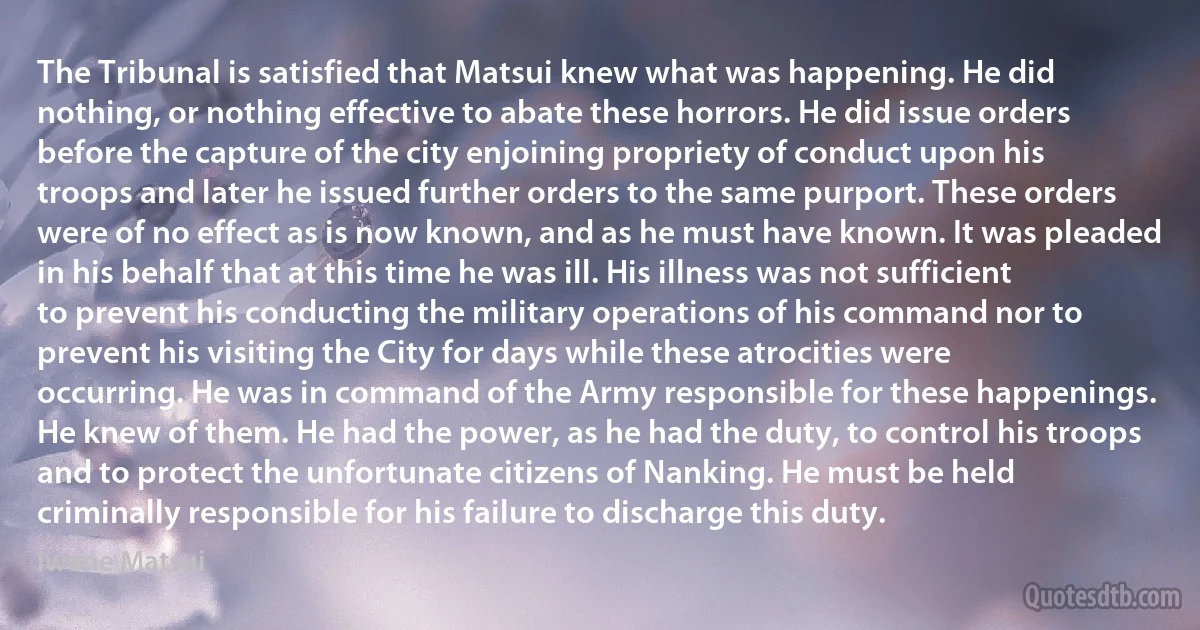
The Tribunal is satisfied that Matsui knew what was happening. He did nothing, or nothing effective to abate these horrors. He did issue orders before the capture of the city enjoining propriety of conduct upon his troops and later he issued further orders to the same purport. These orders were of no effect as is now known, and as he must have known. It was pleaded in his behalf that at this time he was ill. His illness was not sufficient to prevent his conducting the military operations of his command nor to prevent his visiting the City for days while these atrocities were occurring. He was in command of the Army responsible for these happenings. He knew of them. He had the power, as he had the duty, to control his troops and to protect the unfortunate citizens of Nanking. He must be held criminally responsible for his failure to discharge this duty.
Iwane MatsuiRelated topics
army city command conduct conducting control discharge duty failure hold ill illness known later nor nothing now occurring power propriety purport time tribunal unfortunate while days troops operationsRelated quotes
I have long since believed that in spite of all the vigilance that can be infused into post commanders, the special regulations of the Treasury Department have been violated, and that mostly by Jews and other unprincipled traders. So well satisfied have I been of this that I instructed the commanding officers at Columbus to refuse all permits to Jews to come South, and I have frequently had them expelled from the department, but they come in with their carpet-sacks in spite of all that can be done to prevent it. The Jews seem to be a privileged class that can travel anywhere. They will land at any woodyard on the river and make their way through the country. If not permitted to buy cotton themselves, they will act as agents for someone else, who will be at military post with a Treasury permit to receive cotton and pay for it in Treasury notes which the Jew will buy up at an agreed rate, paying gold.

Ulysses S. Grant
[On the attendees at the launch of Apollo 11] Those people were not a stampeding herd, nor a manipulated mob; they did not wreck the Florida communities, they did not devastate the countryside, they did not throw themselves, like whining thugs, at the mercy of their victims - they did not create any victims. They came as responsible individuals able to project the reality of two or three days ahead, and to provide for their own needs. There were people of every age, creed, color, educational level and economic status. They lived and slept in tents, or in their cars, some for several days, in great discomfort and unbearable heat; they did it gamely, cheerfully, gaily; they projected a general feeling of confident goodwill, the bond of a common enthusiasm; they created a public spectacle of responsible privacy - and they departed as they had come, without benefit of press agents.

Ayn Rand
Let us honor all honest human power of contrivance in its degree. The beaver intellect, so long as it steadfastly refuses to be vulpine, and answers the tempter pointing out short routes to it with an honest "No, no," is truly respectable to me; and many a highflying speaker and singer whom I have known, has appeared to me much less of a developed man than certain of my mill-owning, agricultural, commercial, mechanical, or otherwise industrial friends, who have held their peace all their days and gone on in the silent state. If a man can keep his intellect silent, and make it even into honest beaverism, several very manful moralities, in danger of wreck on other courses, may comport well with that, and give it a genuine and partly human character; and I will tell him, in these days he may do far worse with himself and his intellect than change it into beaverism, and make honest money with it.

Thomas Carlyle
True Religion does not manifest itself outwardly, and impels man to no course of external conduct which he would not otherwise have adopted, but that it only completes his true In ward Being and Dignity. It is neither an Action, nor an incentive to Action, but a Thought:-it is LIGHT, and the One True Light, which bears within it all Life and all the forms of Life, and pervades their innermost substance. Once arisen, this Light flows on spontaneously forever, spreading itself forth without term or limit;-and it is as idle to bid it shine, as it would be to address such a command to the material sun when it stands in the noon-day heavens. It does this without our bidding; and if it shine not, then has it not arisen. At its uprising, Darkness, and the brood of spectres and phantasms which are born of Darkness, vanish of themselves.

Johann Gottlieb Fichte
It is the habit of the boa constrictor to besmear the body of his victim with a foul slime before he devours it; and there are many people in England, and perhaps elsewhere, who seem to be unable to contemplate military operations for clear political objects, unless they can cajole themselves into the belief that their enemy are utterly and hopelessly vile. To this end the Dervishes, from the Mahdi and the Khalifa downwards, have been loaded with every variety of abuse and charged with all conceivable crimes. This may be very comforting to philanthropic persons at home; but when an army in the field becomes imbued with the idea that the enemy are vermin who cumber the earth, instances of barbarity may easily be the outcome. This unmeasured condemnation is moreover as unjust as it is dangerous and unnecessary.

Winston Churchill
